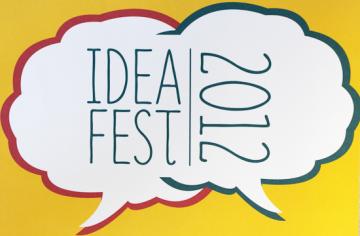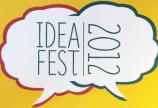IDEAFEST 2012: New media remediates old media
- Kayla Pepper

The Faculty of Humanities went parliamentary for IdeaFest with their humourous but insightful March 7 debate about whether or not the book is dead. Dean of Humanities Dr. John Archibald acted as “The Speaker of the House” in the packed lecture class turned House of Commons.
With the support from Dr. Martha McGinnis (linguistics), “Prime Minister” Dr. Margaret Cameron (philosophy) declared that the book is dead. The pro-print argument was spearheaded by “Leader of the Opposition” Dr. Jentry Sayers (English) with support from Dr. John Tucker (English). After Mr. Speaker reminded the audience that “proper parliamentary decorum is to be followed,” the debate began.
For Madame Prime Minister, the book is a “complex cultural artifact that is deeply entwined in cultural institutions and bound up in our systems of value.” She argued that “the death of the book will only increase opportunities for reading and writing.” The Gutenberg book resulted in a 500-year interruption of oral culture reducing people’s ability to memorize and engage in dialogue. This is changing with the invention of the “new book” (e-book or audio book). The new book employs interactive multi-media to support and contextualize modern works with additional videos, audio and hyper-links.
This post-Gutenberg era of bookmaking benefits academics by inviting more people to read their contributions that may have previously remained solitary, unrecognized or unread efforts. Books in print give a false perception of ultimate truths, but Madame Prime Minister states that new books demonstrate how “knowledge itself is not static, but continues to grow.”
“Opposition Member” Tucker argued that the book is alive and flourishing. Medieval books are responsible for saving ancient works, and the Gutenberg book continues to be a “superior technology” for its usability—as compared to the obsolete technology of the scroll.
Maintaining the elevated humour of the debate, Tucker argued that the modern book is also superior to digital technology that can seem “elitist” due to its requirement for “sophisticated knowledge” and “expensive equipment.” Plus, an audio book does not pause when one falls asleep reading it and, despite the environmental argument, Google “consumes as much energy as all the airlines of the USA combined.” Books are also political—especially when religious texts are burned. This extreme example shows their cultural significance. “The book cannot die, but it can kill,” said Tucker.
McGinnis presented a rebuttal, stating that the e-book is indeed easier to read in bed. And while Google Books does require a lot of energy, the pulp and paper industries create a huge environmental cost. Her argument revolved around how “the printed book is a pale shadow of the full communicative experience.” The printed book “conveys a narrow range of information” that fails to capture the nuances of body language, expression and narrative flow the way audio or video can.
Through new books, endangered languages (of which there are nearly 2,000) can be preserved through these audio or video recordings.
The linear organization of modern books, such as the dictionary, lends itself better to e-books because readers can search sounds that mimic the way they hear them rather than flip pages organized in alphabetical order.
Finally, she argued that the modern book is a tool of cultural imperialism. If literacy is a cultural practice, the written words from a specific place entrench beliefs which are then passed down to future generations.
Leader of the Opposition Sayers’ argument opened with statistics from the National Reading Campaign. In the week of Jan. 23–29, 2012, 111,000 e-books were sold compared to 1,153,000 print books. E-book sales contribute to 10 per cent of book sales in Canada. “In Canada there is simply no compelling statistical evidence that print sales are dramatically down,” he said. Plus, who wants to give up reading in the bath tub?
His argument focused around how new media (e-books) remediate old media (print books). They cannot exist dichotomously because they’re “social artifacts” and “the relationship between them need not be framed antagonistically.” Just like how vinyl LPs are now often sold with digital downloads, print textbooks are often supplemented with electronic resources. “The book is a market rendered new,” he said. His final comment was that “if the future of the book is like the future of education, both may be changing, but let’s not kill them off yet.”
Prime Minister Cameron’s two-minute closing statement commented on the popular debate that reading books on tablets with internet access encourages distraction and procrastination. She said the distraction is a good thing. It showcases the complexity of human beings and human experiences in the post-Gutenberg era and encourages us to evolve to (re)cultivate skills such as focus, concentration and discernment. Digital books challenge everyone working with text. “They will leave faculty to become more innovative, more creative and to exploit the possibilities of unbound text and ultimately, the unbound classroom,” she said.
Before Mr. Speaker called a vote, statements from the floor were presented from members of the gallery. Support for books ranged from limited internet accessibility to e-books, the ease in spreading of religion to third world countries, emotional attachment to print books when they're passed along from loved ones with marginal notes, the option for script annotations when rehearsing theatre productions, the impact of tablet screens on childhood development and the preservation of democracy even when there is a crackdown on technology. One centrist comment was that “the advancement of one technology does not suggest the obsolescence of another.”
When Mr. Speaker banged the gavel on the podium, the vote was called, and all but ten audience members voted that the book, in all its textual magnificence, has an extensive, influential and entertaining life ahead.

